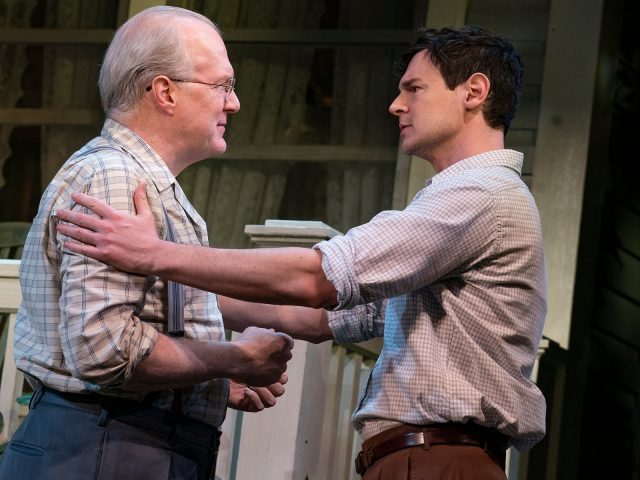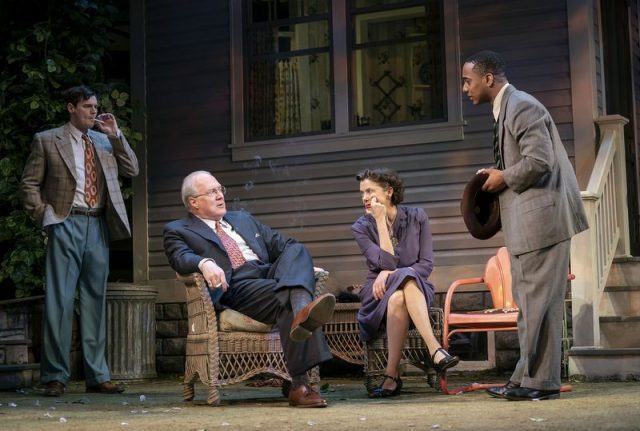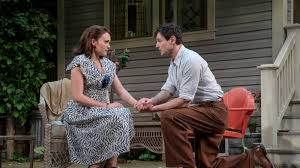
Joe Keller (Tracy Letts) and his son Chris (Benjamin Walker) face off in Roundabout revival of All My Sons (photo by Joan Marcus)
American Airlines Theatre
227 West 42nd St. between Broadway & Eighth Ave.
Tuesday – Sunday through June 30, $99-$352
212-719-1300
www.roundabouttheatre.org
In Jack O’Brien’s poignant Roundabout revival of Arthur Miller’s breakthrough play, All My Sons, an all-American family is caged in a psychological, metaphorical jail as their world falls apart over the course of a hot August day in 1947. The story takes place in the comfortable Midwest suburban backyard of the home of Joe and Kate Keller (Tracy Letts and Annette Bening), where the consequences of WWII are building in intensity, turning their house into a prison of their own making. Their oldest son, Larry, a pilot in the war, has been missing for three years. While Joe, a sturdy, self-made factory owner, and Larry’s younger brother, Chris (Benjamin Walker), an idealist who also fought in the war, have accepted Larry’s death, Kate refuses to believe he is gone, insisting that he is alive and will be back any minute. Chris has invited Larry’s former girlfriend and their childhood neighbor, Ann Deever (Francesca Carpanini), to visit them so he can propose to her; Joe tries to talk him out of it, telling him that it would destroy Kate. Ann’s brother, George (Hampton Fluker), is also on his way to the Kellers’ house after speaking with his father, Steve, who is in prison; Steve, Joe’s former business partner, was locked up for a crime that Joe might know a lot more about than he’s admitting.
“Can I see the jail now?” Bert (alternately played by Alexander Bello or Monte Green) asks Joe, who has made the eager young boy a detective to keep watch over the community. “Seein’ the jail ain’t allowed, Bert. You know that,” Joe says. “Aw, I betcha there isn’t even a jail. I don’t see any bars on the cellar windows,” Bert responds. “Bert, on my word of honor, there’s a jail in the basement,” Joe assures him. It’s not long before Joe’s word of honor is under question, as is the American dream itself.

George Deever (Hampton Fluker) has some critical thoughts to share with the Keller clan in Arthur Miller Broadway revival (photo by Joan Marcus)
All My Sons, which won a Best Author Tony for its Broadway debut (directed by Elia Kazan and starring Ed Begley, Beth Miller, Arthur Kennedy, and Karl Malden) and was named Best Revival forty years later (with Richard Kiley, Joyce Ebert, Jamey Sheridan, and Jayne Atkinson), isn’t a bit creaky despite being more than seventy years old. The central issue it deals with — the devastating impact war can have on families — is an unfortunately universal, timeless one. “Well, that’s what a war does,” Joe tells neighbors Frank and Lydia Lubey (Nehal Joshi and Jenni Barber). “I had two sons, now I got one. It changed all the tallies. In my day when you had sons it was an honor. Today a doctor could make a million dollars if he could figure out a way to bring a boy into the world without a trigger finger.”

Chris (Benjamin Walker) wants to marry Ann (Francesca Carpanini) against his parents’ wishes (photo by Joan Marcus)
Three-time Tony winner O’Brien (Hairspray, The Hard Problem), who directed a 1987 television adaptation that featured James Whitmore, Aidan Quinn, Michael Learned, and Joan Allen, also focuses on rampant postwar consumerism and profiteering; the key plot point evokes the recent controversy over the safety of the Boeing 737 Max. “Money. Money-money-money-money. You say it long enough it doesn’t mean anything,” explains Dr. Jim Bayliss (Michael Hayden), who lives in the Deevers’ old house and complains of his wife’s (Chinasa Ogbuagu) insistence that he make more cash. Award-winning playwright and actor Letts (Mary Page Marlowe, Who’s Afraid of Virginia Woolf?) is sublime as Joe, a robust man who is willing to do anything to protect his family, while Bening (Coastal Disturbances, King Lear) is haunting as Kate, who appears to be a shadow of a woman, seemingly existing solely for Larry and living in a fog. The couple is trapped in their home, unable to escape the lies they’ve surrounded themselves with; Walker (Bloody Bloody Andrew Jackson, American Psycho) is bold and strong as Chris, the only one who can actually leave the premises as he considers a life somewhere else. Each of the three acts (with one intermission) begins with a projection of the Keller house on a translucent scrim, slowly rising to reveal Douglas W. Schmidt’s set as if a jail door opening. “It’s bad when a man always sees the bars in front of him. Jim thinks he’s in jail all the time,” Sue tells Ann. O’Brien knows his subject matter and directs with a sure hand and the confidence that comes with understanding the responsibility of helming a Great American Play, one that feels that it hasn’t aged a bit after all these decades.